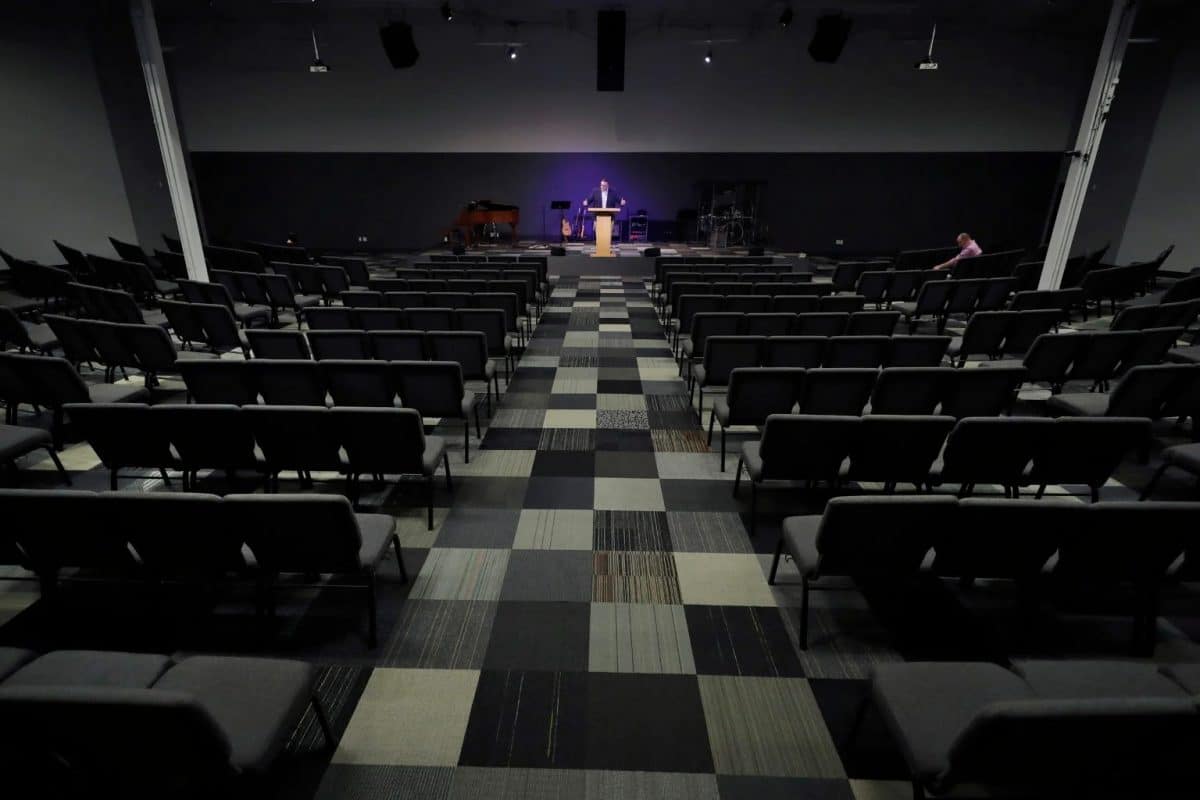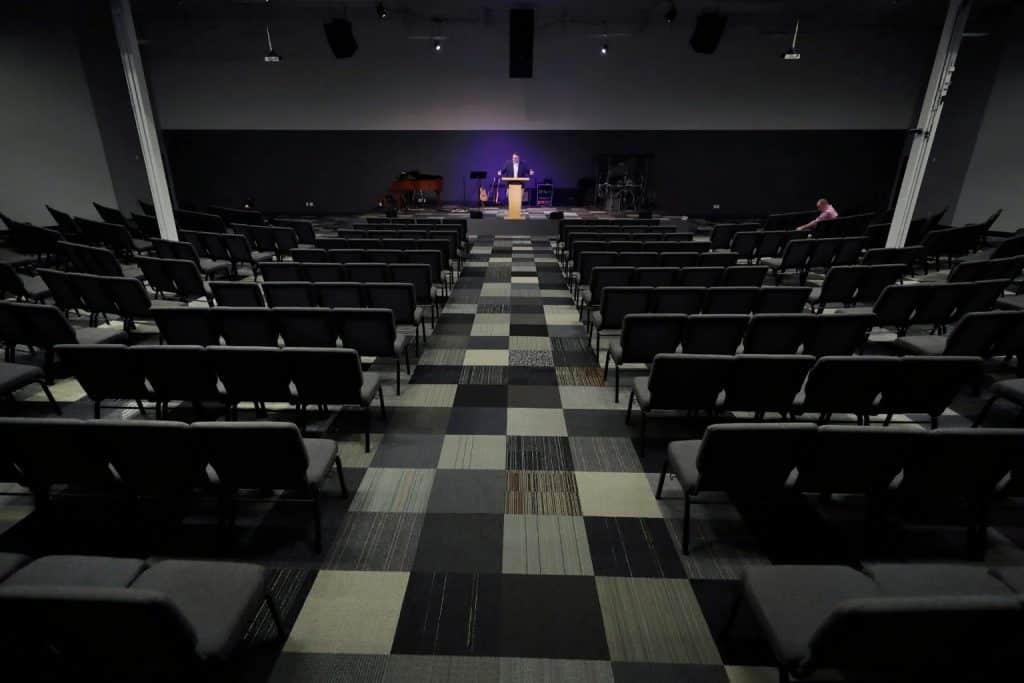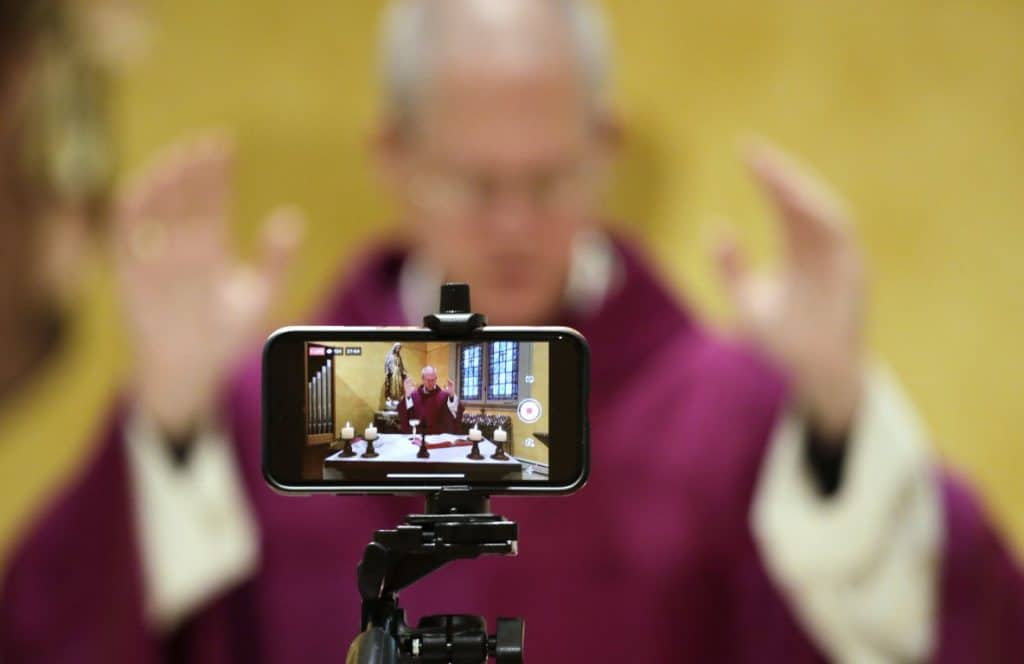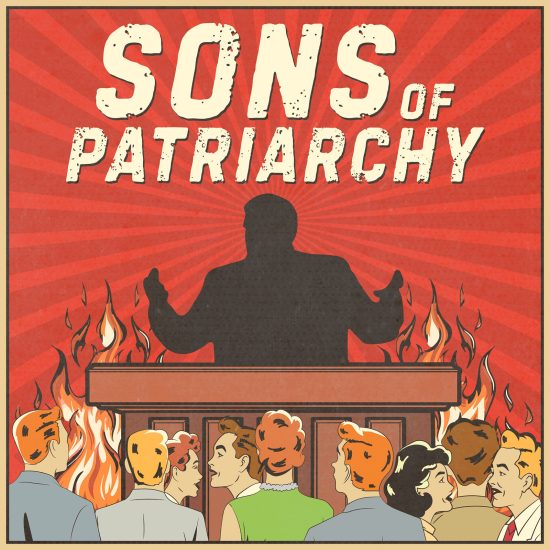

Josh Kellso, a pastor at Grace Bible Church, delivers a sermon via livesteam for virtual attenders from an empty sanctuary Sunday, March 22, 2020, in Tempe, Ariz. Many houses of worship have suspended all in-person services and programs and moved to online services in compliance with CDC guidelines to promote social distancing in the effort to slow the spread of the COVID-19 coronavirus. (AP Photo/Matt York)
(RNS) — Three questions hang over the last scenes of “Hamilton,” the musical: “Who lives? Who dies? Who tells your story?”
The answers, for us in the COVID-19 crisis, have come to depend on the political persuasion of the state we live in. That’s a true shame for many reasons. Playing politics with people’s lives is a good way to avoid asking some hard questions about who we are as a country.
But what about who we are as a church? Church folks are surely free to make their own careful decisions based on what we believe about who we are as gospel community, right?
Not so, as it turns out. Some leaders in the church are irresponsibly calling for a quick return to church as we knew it, before COVID turned our entire lives upside-down. Overcoming the virus is going to be a long process, they argue. We might as well push ahead toward “getting things back to normal” sooner rather than later.
What a sad and limited view of God’s vast, surprising and relentless work in the world. Those calling for a quick return to the familiar are embodying the tragic lack of imagination that has put the church in a steady spiral of decline.
Instead, we should be asking some difficult questions — ones we should have been asking long before we had to halt in-person worship: Who are we as the church, and what are we called to be in the world? Do we exist to nurture justice and the thriving of all people, to stubbornly model for the world Jesus’ ethic of inescapable mutuality, of loving our neighbors? Or do we want to be … something else?
Those are uncomfortable questions to consider. They ask Christians to imagine our corporate life as prophetic witness rather than a capitalist operation. But recall that following Jesus has never been a safe or easy choice.

A cell phone is used to livestream mass by Archbishop Paul D. Etienne at St. James Cathedral, the Cathedral for the Catholic Archdiocese of Seattle, where open masses have been suspended because of the coronavirus outbreak, Saturday, March 28, 2020, in Seattle. The church remains open for people to sit in the sanctuary in the mornings and is live streaming a mass every morning. (AP Photo/Elaine Thompson)
Like many of you, I also miss church as we used to know it — I miss my whole life, too, actually. But anyone insisting on a quick return to life pre-COVID is ignoring a foundational principle of Christian faith: that God is in the business of perpetually creating new life, resurrection, a future based on a faith that is predisposed to innovation and new creation, as Paul would say.
These decisions about when and how to reopen are complex, of course. Church leaders everywhere are watching national trends, following the advice of credible scientists and listening carefully to experts on activities like Communion and congregational singing. We are proceeding with utmost caution, mindful of best practices. But the only true course open to us is the hard work of showing the world a model of radical love of neighbor.
Madison Reid McClendon, of University of Chicago’s Divinity School, writes:
“The most powerful statement the church can make as to the value of human life, the dignity of human persons, and the sacred task we each have to care for our siblings as if we are their keeper, is to stay closed long after all other entities have opened. The most essential business imaginable is the protection of human life, and by staying closed the church pays witness to these values in the world when all others forget and move on and pay the price in blood.”
I have to wonder if those among us pushing for a swift return to church as we knew it are forgetting that even though the church building is closed, the work of the church continues: building community, proclaiming truth, working for justice. And we will find a way to do that work, even if it’s not as familiar as sitting in a pew.
And if a lack of imagination will not allow you to innovate new and exciting ways to be the church sans paper bulletin and a pulpit complete with fake flower arrangement, it might be time to think more deeply about whether or not what you really want to return to is, in actual fact, the church after all.






